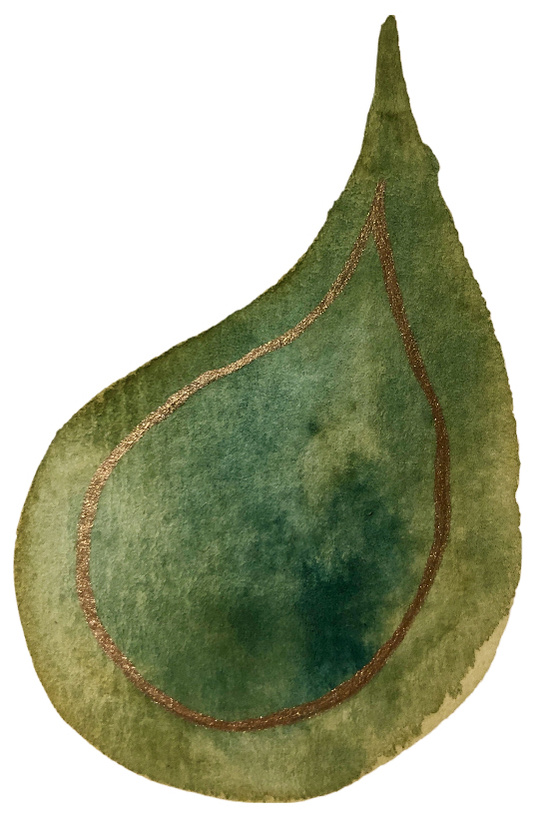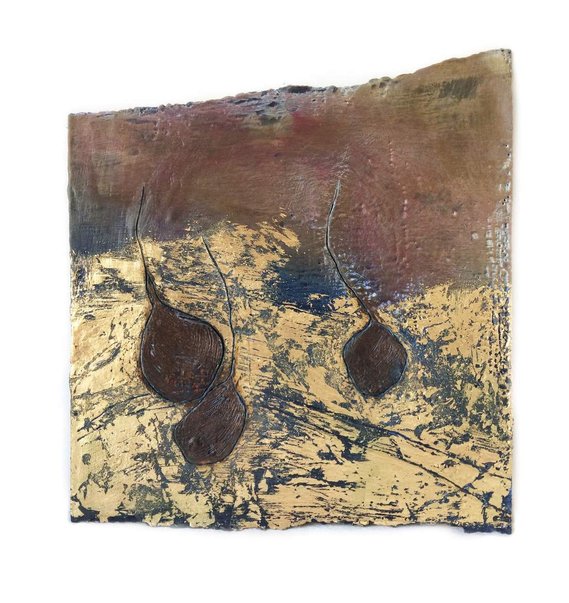Dani Minuskin
Art Therapist | MA, CCC
Hi, I'm Dani.
I'm an artist, art therapist, and counsellor based in Tiohtiá:ke/Montréal.
As an art therapist and certified counsellor, my goal is to help you connect with yourself and access your inner guide. Difficult and traumatic experiences often leave traces and show up in the ways that we experience the world around us. Using processes to achieve emotional and nervous system regulation, I strive to help you experience the world more peacefully.
I offer individual art therapy and counselling to adults who have had difficult life experiences and are seeking to heal their wounds and reconnect with themselves.
What is Art Therapy?
Art therapy takes an art-based approach to therapeutic counselling. In the therapy space, artmaking offers the possibility of accessing difficult experiences - often those that are challenging to communicate - in a gentle, safe, and contained way.
Often, an art therapist will provide prompts that invite the client to engage in artmaking in an intentional and thought-provoking way. This process allows the inner world of the client to become externalized and explored through metaphor and with curiosity. I see this artwork as a mirror that allows alternative views into our inner landscape.
No artistic experience is necessary to participate in art therapy! It is entirely about the process and the power of self-expression.
I believe that you are the sole expert of your life experience and greatly value you having agency in your healing. My role as therapist is to support and enhance this sense of agency.
My Therapeutic Approach
Although art therapy is my foundation, I utilise many other therapeutic interventions in order to address the client's 'stuck' points. I hold a trauma-informed, intersectional, and culturally sensitive lens while constantly working to sustain an anti-oppressive and decolonized practice through continuous self-reflexion, learning, and listening. Practicing sensitivity and humility when engaging with clients and communities is very important to me.
My client-centered approach to clinical work integrates somatically-rooted art therapy with trauma-sensitive mindfulness, nervous system regulation, and trauma-informed care.
Frequently Asked Questions
What does an art therapy session look like?
This is different for each client and their individual needs, but a typical session looks like this: I offer you some tea or water as you settle into the space. You'll share what has been on your mind lately or what is alive in you today. You'll hear me ask very often, "what do you notice in your body as you talk about that?". As you explore the sensations that you notice, I'll invite you to express, through artmaking, whatever is coming up for you. This looks different depending on your needs; sometimes it is 5 minutes, sometimes it is 45 minutes. We'll then explore your artwork in conversation, with curiosity, perhaps through metaphor. This process often leads to some insights or new awareness of your internal landscapes. This process facilitates a practice of holding space for difficult emotions that arise and encourages resiliency through developing greater capacity and tolerance for discomfort.
Why would I choose art therapy over talk therapy?
Although talk therapy works for many people, sometimes difficult lived experiences are too challenging to talk about. It can feel fragmenting and overwhelming to find words for experiences that are unspeakable. I find that art therapy can help you access those wounded parts of you in a gentle and contained way while still providing a sense of safety in the distance inherent in self-expression through metaphor. Furthermore, the creative arts therapies can provide a more wholistic therapeutic experience through their capacity to access multiple sensory points. Creative arts therapies have been shown to be very effective in treating symptoms related to traumatic experiences.
What if I don't want to make art?
If you don't feel like making art on a particular day, that's fine. Sometimes we just need to talk. That said, as an art therapist, the option of artmaking will always be available.
Do you offer in-person or virtual sessions?
I offer both in-person and virtual services.
What is the accessibility information for your studio?
Unfortunately my studio is not wheelchair accessible as there is one flight of stairs to reach the main floor. There is no elevator in the building. The studio is located about a 10-minute walk from metro Mont-Royal (orange line), there is also a bus that runs frequently. There are three washrooms on the floor, all are gender-neutral single stalls. I keep a low/no-scent environment with dim lighting and fidget toys nearby. A white-noise machine is used to reduce background noise although sometimes speech and loud noises from neighbours can be heard. If you have any concerns about accessibility that I haven't mentioned here, please connect with me!
How often should I come to therapy?
When beginning therapy, it is preferable to be able to commit to weekly or bi-weekly sessions. As you start to feel better, slowing down to monthly sessions can be supportive. This is very subjective and of course depends on your personal budget and needs.
What is your rate?
My rate is $130 per hour (includes GST + QST). I accept payment via e-transfer.
Do I need a referral to work with you?
Nope! You are welcome to contact me directly.
Do you work with children and adolescents under 18?
I am currently only working with adults over the age of 18 in my private practice.
Do you take insurance?
I can provide receipts as a Counsellor or Naturopath so that you can be reimbursed by your insurance provider.
Coverage may be available for counselling with Canadian Certified Counsellors (CCC) on these insurance companies: Pacific Blue Cross, Equitable Life, Greenshield, Johnston Group, and Sun Life, but it depends on the plan you have with them. Please contact your insurance provider to verify which counselling service providers are approved under your plan.
I can provide Naturopath receipts through the Academy of Naturopaths and Naturotherapists of Canada (ACNN). The following providers do not accept these receipts: Blue Cross, Industrial Alliance and Equitable Life of Canada.
If my services are not covered by your insurance plan, you may be able to use my receipts to receive deductions on your taxes (not applicable in Quebec).
I don't live in Montréal, can I have virtual sessions with you from another province?
Yes, I am happy to provide virtual art therapy services to clients living in any province.
Can you diagnose me or provide a psychiatric assessment?
As an art therapist and Canadian Certified Counsellor, I do not diagnose mental health conditions or provide psychiatric assessments.
Do you offer free consultations?
I have a lot of information about my practice available on my website but if you have further questions, I am happy to offer a free 20-minute consultation. This is a good opportunity to get a first impression and decide whether you would like to book a full session with me. However, the initial consultation is not necessary. Please contact me to book a free phone consultation or an initial appointment.
What's the first session like?
In the first session I will ask you some questions about your world in order to get a good sense of what your needs are. This will feel more like a conversation. You will have the space to share anything you feel is pertinent information and to ask me questions. We will explore what your goals are for yourself and you'll gain a good sense of how we will move forward together.
Are you a member of any accrediting organizations?
Yes! I am a Professional Member of the Canadian Counselling and Psychotherapy Association (CCPA) posessing a Canadian Certified Counsellor (CCC) designation and a Professional Member of the Canadian Art Therapy Association (CATA).
What's your educational background?
I received my MA in Creative Arts Therapies (Art Therapy Option) from Concordia University in Montreal and my BFA in Drawing and Painting from OCADU in Toronto. I also keep up to date with regular workshops and trainings related to my art therapy and counselling practice as required to maintain my CCC designation.
I am looking for a therapist that relates to my lived experience. What are your intersecting identities?
I am an anglophone Canadian-Israeli Ashkenazi queer settler. I relate to the neurodivergent experience and offer a neurodivergent-affirming space.
Please feel free to contact me if you have any unanswered questions!




